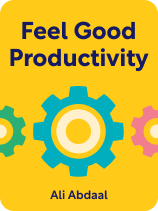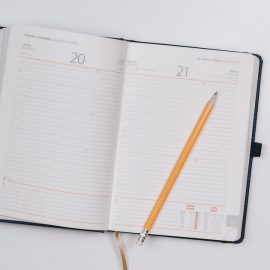

This article is an excerpt from the Shortform book guide to "Feel-Good Productivity" by Ali Abdaal. Shortform has the world's best summaries and analyses of books you should be reading.
Like this article? Sign up for a free trial here.
Do you have control of your life? Do you know how to empower yourself?
One of Ali Abdaal’s sources of emotional well-being is empowerment. This means having a sense of control over your actions, work, and life.
Below we’ll look at Abdaal’s three suggestions about how to empower yourself.
1. Pretend You’re Already Empowered
Abdaal’s first suggestion about how to empower yourself is to be bold. Even if you don’t feel like you’re in control, you can still act like you are. Imagine yourself as somebody with great confidence and self-esteem, and pretend to be that person. With time and practice, it will feel less and less like pretending.
In other words: Fake it until you make it.
(Shortform note: This tactic is often called “acting as if,” and it’s common advice for people who struggle to project confidence. For example, in Goals, motivational speaker Brian Tracy suggests envisioning the person you want to be and then acting as if you already are that person. One way to start is by finding a role model—someone who’s already acting the way you want to act—and emulating them. Tracy adds that you can get yourself into your role model’s mindset by dressing like them, adopting some of their values (especially regarding work), and, if possible, directly asking them for advice.)
2. See How You’ve Already Improved, Then Keep Improving
Abdaal’s second tip for self-empowerment is to constantly assess and improve your abilities. This helps because knowing that you’re good at what you do will give you a sense of power and control. So, if you’re ever feeling self-conscious about your skills at work or elsewhere, take some time to remember how far you’ve come.
For example, if you like to draw, there will be times when you’re not satisfied with something you’ve created—but if you compare that drawing to something you made when you were just starting out, you’ll realize just how skilled an artist you’ve become since then.
Also, further improving your skills will give you a sense of hope. This is because, even if a situation isn’t what you want it to be, you’ll know that you can improve yourself and eventually change that situation. For instance, if you’re passed over for a promotion at work, you’ll know that you can redouble your efforts and get promoted next time.
| Boost Your Skills With Effective Learning One way to improve your skills is to study. For example, if you want to improve your drawing skills, you could teach yourself new techniques to get the results you want as well as to learn mistakes and pitfalls to avoid. You might do this by studying art theory and the work of other artists. Therefore, your skills in any area will improve more quickly if you start by learning effective study skills—and, as a result, you’ll quickly develop feelings of empowerment and hope. In Limitless, educator and “brain coach” Jim Kwik presents a learning model that he says will make it possible for anyone to learn anything. The Limitless model has three components: 1. Mindframe: You must truly believe in your limitless potential and must be open-minded about new information. In other words, you must know that you’re able to learn, and you must be ready to learn. 2. Drive: You must find ways to motivate yourself to learn about whatever topic you’re studying. This is crucial because even someone who knows they can learn anything still won’t learn about subjects they’re not interested in. The suggestions from our section on the first source of good feelings (fun) can help with this—you’ll be more motivated to learn if the learning is enjoyable. 3. Techniques: You use specific practices to quickly absorb and retain new information. For example, Kwik suggests that you try visualizing what you’re learning about, instead of just trying to memorize the words on a page. |
3. Take Responsibility for Everything
Abdaal’s third suggestion is to take responsibility for everything you do. Though it seems counterintuitive, accepting the consequences of your decisions and your actions is a major part of feeling like you’re in control of your life. That’s because, when you take accountability, you understand that what you do really matters. On the other hand, if you avoid accountability, then it will feel like your actions have no effect on you—in other words, it will seem like you have no control over your own life.
The author adds that even when you can’t choose your tasks or goals (a common situation in the workplace, for instance) you still have control over your mindset and actions. That means it’s up to you whether you want to complain and do a halfhearted job, or to give each task your all even if it’s not what you want to be doing.
| Counterpoint: You’re Always Accountable for What You DoAbdaal discusses the benefits of taking responsibility as opposed to avoiding it, but some other self-help experts say that it’s impossible not to take responsibility for what you do. From that perspective, self-empowerment isn’t about taking accountability, but rather about recognizing that you already are accountable. Mark Manson makes this case in The Subtle Art of Not Giving a F*ck. Manson argues that you always have choices to make, no matter what situation you’re in, and you must therefore hold yourself accountable for those choices. What actions you take—and what personal values you base those actions on—are completely up to you, no matter what external pressures you might be facing. Consider the previous example of an employee who can’t choose their own tasks and goals at work: If their employer tells them to do something unethical or illegal, that employee still gets to decide how they’ll respond. For instance, the employee could do as they’re told, they could refuse, or they could report the company’s behavior to the authorities. Whatever decision the employee makes, they must then accept the consequences of that choice. |

———End of Preview———
Like what you just read? Read the rest of the world's best book summary and analysis of Ali Abdaal's "Feel-Good Productivity" at Shortform.
Here's what you'll find in our full Feel-Good Productivity summary:
- How to stop procrastination at its source and avoid or recover from burnout
- The crucial link between emotional health and productivity
- How to work in ways that feel energizing instead of draining






